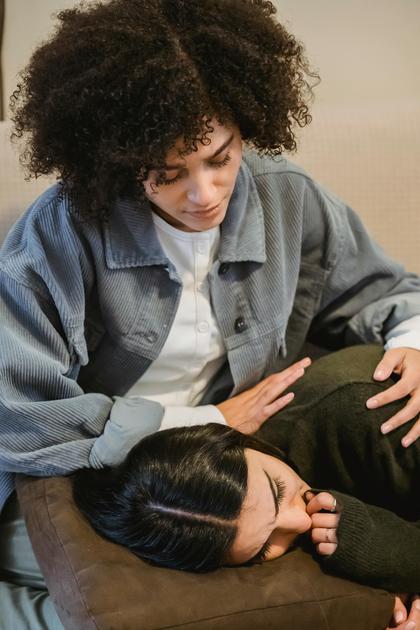Are you struggling with anxiety triggers? For many women over 30, these triggers can often be linked to hormonal imbalances. It’s easy to feel overwhelmed as your body goes through various changes, and understanding these triggers is crucial. In this article, we will dive into how hormones influence anxiety, providing knowledge that can empower you to navigate through these challenging times.
The Calm Reset — 7 Days to Feel Steady, Kind & In Control Again - Only $2.99
Gentle guidance trusted by our community.
Understanding Anxiety Triggers in Women
Women over 30 can experience a range of anxiety triggers that may not have impacted them the same way in their younger years. This age often brings significant life changes, including career pressures, family responsibilities, and shifting social dynamics. These stressors can compound, leading to heightened anxiety. Understanding these triggers is vital to managing anxiety and prioritizing mental well-being.
Moreover, women tend to be more in touch with their emotions, which can amplify anxiety in the face of stress. Recognizing these triggers is the first step towards reclaiming your peace of mind.
The Role of Hormones on Mental Health
Hormones play an essential role in regulating mood and emotional responses. For women over 30, hormonal fluctuations related to the menstrual cycle, pregnancy, childbirth, and perimenopause can profoundly affect mental health. During these periods, changes in estrogen and progesterone levels can lead to mood swings, irritability, and anxiety. Research indicates that hormonal imbalances can be a significant contributor to anxiety in women.
Learning about your hormonal cycles can provide insights into your emotional states and anxiety levels. By understanding the link between your hormonal health and anxiety, you can take proactive steps to manage these changes.
Signs of Hormonal Imbalance Affecting Anxiety
Many women may not realize that their anxiety is linked to hormonal imbalances. Here are some common signs:
- Inconsistent Mood Swings: Experiencing sudden shifts in mood without apparent reason.
- Irregular Menstrual Cycles: Changes in your menstrual cycle that do not align with your typical patterns.
- Fatigue or Sleep Issues: Persistent fatigue, insomnia, or restless sleep can signal hormonal changes impacting anxiety levels.
- Physical Symptoms: Hormonal imbalances may lead to symptoms such as weight gain, headaches, and acne.
If you’re experiencing these symptoms, it’s worth exploring the possibility of a hormonal imbalance and its effects on your anxiety.
Coping Strategies for Women Over 30
Adopting coping strategies is crucial for managing anxiety and hormonal changes. Here are some effective approaches:
- Regular Exercise: Physical activity releases endorphins, which can boost your mood and reduce anxiety.
- Meditation and Mindfulness: Practicing mindfulness can help calm your mind and decrease feelings of anxiety.
- Healthy Diet: Eating balanced meals that include nutrients supporting hormonal health can stabilize mood and anxiety levels.
- Breathing Techniques: Deep breathing exercises can ground you and manage anxiety in the moment.
Many women find success by integrating these strategies into their daily routine.
Exploring Natural Remedies for Hormonal Balance
Natural remedies offer alternative ways to address hormonal imbalances and related anxiety. Here are a few options:
- Herbal Supplements: Natural remedies like ashwagandha, maca root, and evening primrose oil are known to support hormonal balance.
- Acupuncture: This ancient practice can help alleviate symptoms of hormonal imbalance by targeting specific energy points in the body.
- Essential Oils: Lavender and chamomile oils promote relaxation and may help manage anxiety levels.
Considering these options could provide a supportive pathway to hormonal balance and anxiety relief. See here how many women are resolving this without heavy medications.
The Connection between Stress and Hormonal Changes
Stress and hormonal changes are closely intertwined. High stress levels can lead to an imbalance in cortisol and other hormones, exacerbating anxiety symptoms. Learning to manage stress through effective techniques such as yoga, journaling, or engaging in hobbies can help restore hormonal balance.
When to Seek Professional Help
While self-care strategies can greatly assist, it’s crucial to seek professional help if anxiety becomes overwhelming. A healthcare provider can perform tests to identify hormonal imbalances and recommend appropriate treatments or therapies. Professional support offers resources for coping with anxiety, including therapy and, in some cases, medication.
Empowering Yourself: Taking Control of Anxiety
Empowerment comes from understanding and addressing the root causes of anxiety. By educating yourself about your unique hormonal patterns and triggers, you can create a personalized action plan. Such proactive steps are invaluable in navigating mental health, allowing you to forge a path to healing.
Real Stories of Women Overcoming Anxiety
Hearing from others who have faced similar struggles can be incredibly inspiring. Many women over 30 have overcome anxiety through a combination of self-care, support, and natural remedies. Their experiences serve as a reminder that you are not alone in this journey and that positive change is possible.
Simple Steps to Regain Your Calm
Embarking on a journey to improve your mental health doesn’t have to be daunting. Here are a few simple steps that can help you regain your calm:
- Start Journaling: Writing down thoughts and feelings can provide clarity and help you process emotions.
- Create a Routine: Establishing a daily routine fosters stability, reducing anxiety levels.
- Connect with Supportive Friends: Surround yourself with positive influences that uplift and support you.
- Educate Yourself: Knowledge about your body and mind empowers you to make informed decisions regarding your well-being.
Remember, you’ve got the strength to overcome these challenges. By taking small, consistent actions, you can lead a life filled with peace and joy.
It’s possible to improve all these symptoms and challenges by following a simple step-by-step process, just as many other women have successfully done. Explore how these solutions can resonate with you by clicking the link below.
The Calm Reset — 7 Days to Feel Steady, Kind & In Control Again - Only $2.99
Gentle guidance trusted by our community.







